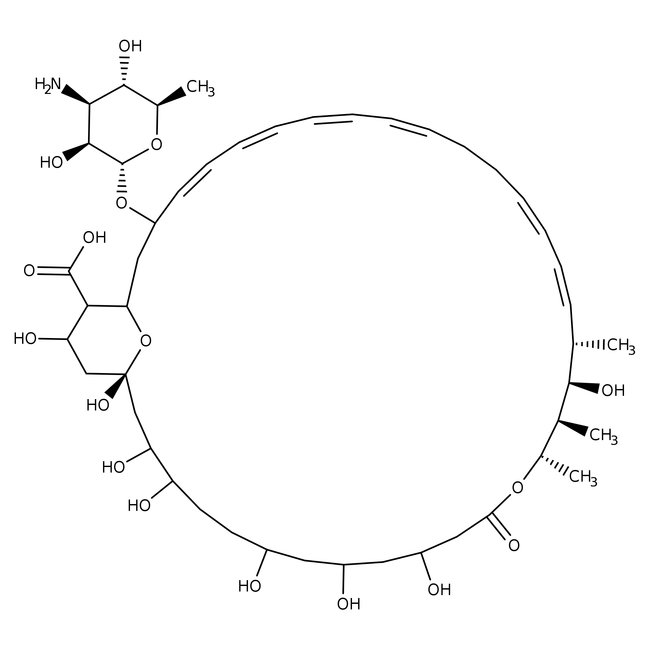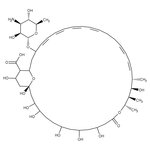Search Thermo Fisher Scientific
Nystatin, 85+%
| Catalog Number | Quantity |
|---|---|
| FSA455500010 | 1 g |
General Description
• Nystatin is a polyene compound that shows anti-bacterial and antifungal activities against Streptomyces noursei, Streptomyces aureus, and other Streptomyces species
• It is also an ionophore with the capacity to increase membrane permeability
• Nystatin is a channel-forming ionophore and exerts its activity via formation of a membrane-spanning pore in the fungal plasma membrane, thus altering membrane permeability, allowing the leakage of intracellular contents, and the subsequent disruption of electrochemical gradients essential for proper cell function
Applications
• In in vitro experiments, Nystatin is an antifungal that is both fungistatic and fungicidal against a wide variety of yeasts and yeast-like fungi
• It has a higher selectivity for fungal cells over mammalian cells since nystatin presents greater binding affinity with ergosterol, a key sterol found in fungal cell walls, as opposed to its mammalian counterpart, cholesterol
• This compound is not active against organisms that do not contain sterols in their cell membrane (for example, bacteria)
• It is used on human macrophage cell line U937, to study its effect on the production of interleukin-8 by silver nanoparticle-treated U937 cell line
• It has the ability to prevent cell culture contamination as well as induce interleukin-1 and -8, and tumor necrosis factor α secretion in TLR2-expressing THP1 cells
• It modulates lipid raft profile in mice macrophages
General References:
- R Holz.; A Finkelstein. The water and nonelectrolyte permeability induced in thin lipid membranes by the polyene antibiotics nystatin and amphotericin B. The Journal of general physiology. 1970, 56, (1), 125-145.
- Kim, S.; Choi, I.H. Phagocytosis and endocytosis of silver nanoparticles induce interleukin-8 production in human macrophages. Yonsei Med J. 2012, 53, (3), 654-657.
- Razonable, R.R.; Henault, M., Watson, H.L.; Paya, C.V. Nystatin induces secretion of interleukin (IL)-1beta, IL-8, and tumor necrosis factor alpha by a toll-like receptor-dependent mechanism. Antimicrob Agents Chemother. 2005, 49, (8), 3546-3549.



